Coronavirus could hit Britain’s economy harder than the Spanish flu epidemic of 1918 and the First World War, the Financial Times reports. It says the bleak warning from the UK’s fiscal watchdog shows national output could drop by 35% in the second quarter of 2020, in the event of a three-month lockdown followed by three months of partial restrictions.
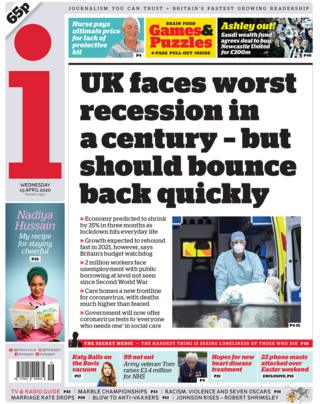
The i also leads on the stark assessment from the Office for Budget Responsibility (OBR) but is quick to point out that any economic downturn “should bounce back” to normal by next year. The paper says two million workers face unemployment as a result of the pandemic.
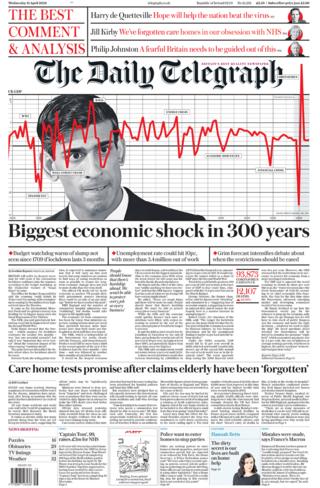
Emblazoned across the Daily Telegraph is a graph depicting the UK’s GDP over the past century – with the added “grim forecast” set out by the OBR. The “biggest economic shock in 300 years” intensifies the debate about when measures should be lifted, the paper claims.
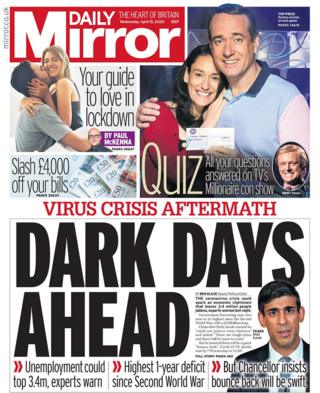
Under the headline “dark days ahead”, the Daily Mirror says an “economic nightmare” leaving up to 3.4 million people unemployed could come in the aftermath of the pandemic. It says a projected £218bn increase in government borrowing would be the highest since the Second World War.
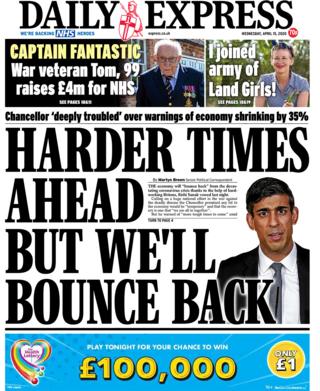
Chancellor Rishi Sunak said he was “deeply troubled” by the OBR’s forecast, the Daily Express reports. The tabloid says Mr Sunak promised any hit to the economy would be “temporary” – but that there were “more tough times to come”.
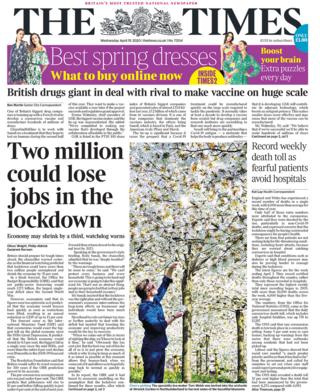
Some economists said the OBR’s forecast of a “bounce back” was too optimistic, according to the Times. It adds that the International Monetary Fund said the pandemic would take the biggest toll on the world economy since the Great Depression in the 1930s.
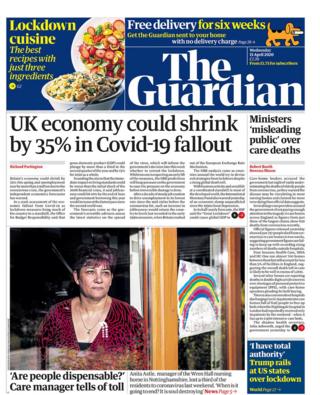
The Guardian claims the OBR’s “stark assessment” has “sounded the alarm” on the economic impact of lockdown restrictions. Whilst no one is expecting the measures to be lifted following a review this week, the paper says, the OBR predictions will “heap pressure” on the government to ease financial burdens before “irreversible damage” is done.
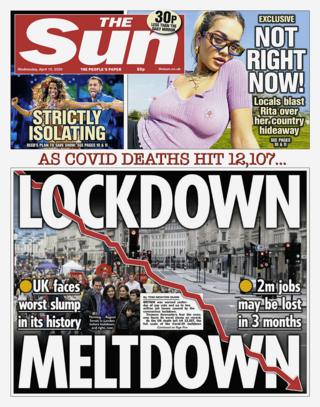
The Sun sums up the OBR forecast with the headline “lockdown meltdown”. With contrasting images showing London’s Regent Street before and after social distancing measures were introduced, the paper concludes that the UK faces its worst economic slump in history.
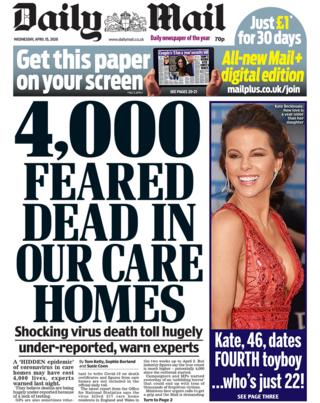
Instead of focusing on the economic warning, the Daily Mail leads on what it calls the “hidden” coronavirus-related deaths in care homes across the UK. It says experts warn a lack of testing may have contributed to up to 4,000 deaths, which are not included in official daily figures.
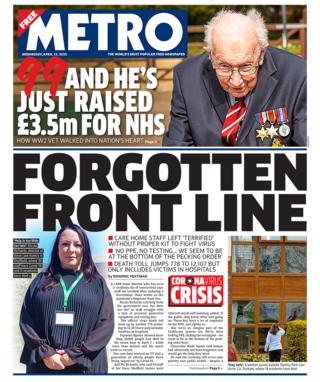
The Metro calls workers in these care homes the “forgotten front line”, as it tells of staff struggling to tackle the virus with a lack of protective equipment. The paper also gives a nod of appreciation to 99-year-old war veteran Tom Moore, who has “walked into the nation’s heart” by raising £3.5m for the NHS in a sponsored walk – 100 lengths of his garden before he turns 100.
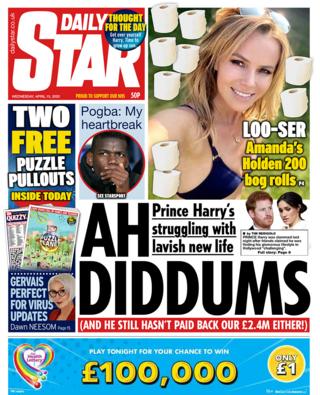
And in a departure from coronavirus, the Daily Star leads on a story about the Duke of Sussex who is, the paper says, struggling to adjust to his new life after he and wife Meghan stepped back from life as senior royals. “Ah diddums” reads the unsympathetic headline.
“More austerity would be a cruel slap in the face,” is the message to the government in the Daily Mirror’s editorial, as it considers the impact of the dire economic forecasts released on Tuesday.
The paper suggests the rich should be asked to pay more tax but life should not be made harder for people including nurses, cleaners and bus drivers when the lockdown is lifted.
The Sun uses its leader column to suggest restarting the economy is not just a “lives versus money and jobs” debate. It says there should be more consideration given to possible deaths from poverty, unemployment and tax rises from a “paralysed” economy.
In the New Statesman, Stephen Bush considers whether there has been enough focus on what he calls “peak lockdown performance” of the economy.
He says the job retention scheme should have been one of a “suite of government policies” – citing the example of a business which ended up furloughing staff because they could not afford the transition to home-working.
Image copyright
Google
More than a third of the residents at Wren Hall care home in Nottinghamshire died over the Easter weekend
“Are people dispensable?” is the question asked by one nursing home manager in the Guardian.
Anita Astle, who is in charge of Wren Hall in Nottinghamshire, tells the paper that more than a third of its residents died with coronavirus over the Easter weekend.
She says the situation is getting “harder and harder” and that the sight of empty bedrooms has left staff feeling “broken inside”.
With the risk of contagion being high, she reveals the only solace she could offer one grieving family was to be in the home’s car park at eleven o’clock in the evening as undertakers arrived to collect their relative’s body.
The Metro’s headline describes care homes as the “forgotten front line” of the coronavirus pandemic.
Despite Chancellor Rishi Sunak’s assurances the sector will get the help it needs, one director of three homes in Sheffield is quoted in the paper saying the offer is “too little, too late” as her staff deal with a shortage of personal protective equipment and testing kits. Eleven of her residents have died.
Get news from the BBC in your inbox, each weekday morning
The Daily Mail’s Ian Birrell believes what’s happening in care homes is a “callous betrayal” of the most vulnerable in society.
He says the situation “shames politicians” who are “spouting platitudes” – pointing out that Health Secretary Matt Hancock has responsibility for both the health service and social care.
He concludes by saying that the sector has been “savaged by austerity… unlike the NHS”.
The Daily Telegraph’s Jill Kirby is similarly critical, writing that there is a “dismal irony” that the UK’s “national and quasi-religious obsession” with the health service has pushed care homes out of the picture.
Image copyright
BBC/Ray Burmiston
Would the Strictly stars of 2019 have embraced a lockdown with their dance partners?
Finally, the Sun claims the bosses of Strictly Come Dancing are planning to put the celebrity contestants in isolation with their dance partners, if social distancing rules are still in place later this year.
The paper says the idea is currently being tried in the German version of the show.
Given previous instances of Strictly celebrities leaving their other halves to start a new life with their dance partners, the Sun asks: “what could possibly tan-go wrong?”